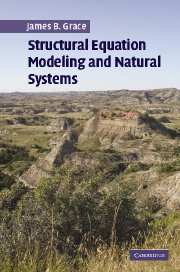Book contents
- Frontmatter
- Contents
- Preface
- Acknowledgments
- PART I A BEGINNING
- PART II BASIC PRINCIPLES OF STRUCTURAL EQUATION MODELING
- PART III ADVANCED TOPICS
- PART IV APPLICATIONS AND ILLUSTRATIONS
- PART V THE IMPLICATIONS OF STRUCTURAL EQUATION MODELING FOR THE STUDY OF NATURAL SYSTEMS
- 12 How can SEM contribute to scientific advancement?
- 13 Frontiers in the application of SEM
- Appendix I Example analyses
- References
- Index
12 - How can SEM contribute to scientific advancement?
Published online by Cambridge University Press: 04 December 2009
- Frontmatter
- Contents
- Preface
- Acknowledgments
- PART I A BEGINNING
- PART II BASIC PRINCIPLES OF STRUCTURAL EQUATION MODELING
- PART III ADVANCED TOPICS
- PART IV APPLICATIONS AND ILLUSTRATIONS
- PART V THE IMPLICATIONS OF STRUCTURAL EQUATION MODELING FOR THE STUDY OF NATURAL SYSTEMS
- 12 How can SEM contribute to scientific advancement?
- 13 Frontiers in the application of SEM
- Appendix I Example analyses
- References
- Index
Summary
Motivation for studying complexity
Ecological science has changed in character over the past few decades. Of course it changed before that time, but the past 30 years is the part to which I have been a direct witness. I like to say that during that period, ecologists have gone from being the harbingers of doom to the advisors of the future. Increasingly, we are asked, what will happen if …? While general opinions abound, it is rare that we have solid answers.
A rising awareness that the ecological science of the past will not meet tomorrow's needs can be seen in several recent major science initiatives from many of the world's leading science agencies. Among these initiatives are ones that promote greater focus on long-term studies, those that enhance efforts to promote ecological synthesis, those that foster interdisciplinary studies, and those that encourage a broader range of scientists to apply their knowledge to applied problems.
Recently, the call for studies designed to address “biocomplexity” has been taken up in several parts of the world. One of the leading proponents for the study of biocomplexity has been Rita Colwell, of the US National Science Foundation, who states, “The fundamental and underlying principle [behind the NSF Biocomplexity Initiative] is that we must move from strictly reductionist research to research that synthesizes information and work toward a holistic approach to understanding and wisely managing the environment.”
- Type
- Chapter
- Information
- Structural Equation Modeling and Natural Systems , pp. 291 - 308Publisher: Cambridge University PressPrint publication year: 2006



